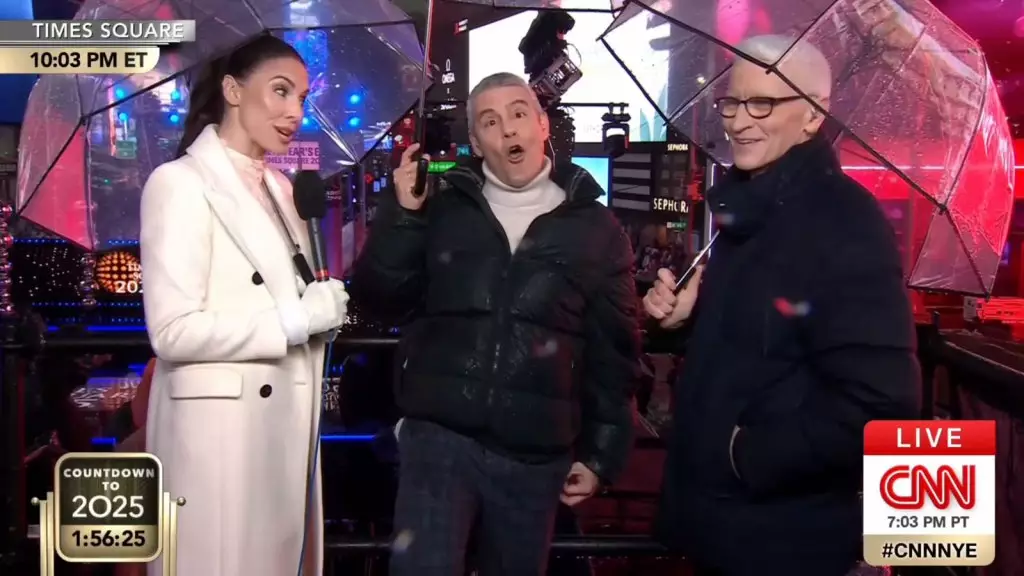The CNN New Year’s Eve Live special has become a platform that attracts an array of comedic talent, and this year, Whitney Cummings undoubtedly brought her signature humor that sparked not only laughter but also a healthy dose of provocation. With a sharp wit and penchant for satire, Cummings sought to reinvigorate the celebratory atmosphere of Times Square on a rainy night while simultaneously questioning societal norms and pop culture.
Cummings’ fiery entrance immediately established her as a dominant presence on stage. By referencing Anderson Cooper’s past co-host Kathy Griffin, she seamlessly intertwined herself into the show’s legacy. “Was that thunder?” she quipped, pointing fingers at her fellow entertainers, and the audience could feel the electric tension as she mentioned Griffin’s infamous past. Cummings has a talent for unearthing nostalgic touchpoints in pop culture, utilizing them to her advantage, teasing the boundaries of humor that often hint at deeper societal critiques.
The chemistry between Cooper and Cummings felt palpable, as she taunted them with a playful jab, “I thought it was Kathy Griffin screaming at you from the street?” This line highlights how intimately woven the fabric of comedy is with cultural context—the historical wedding of Griffin’s controversial antics and CNN’s evolving public image led to an awkward but striking comedy showdown. Cummings not only honored this legacy; she also boldly challenged it by positioning herself within it.
Cummings reflected on her impressive comedy career, stating that in 2025 she would continue to perform in increasingly larger venues. Ironically, she juxtaposed this personal success with a pointed joke about CNN’s dwindling ratings, noting, “I thought being a mom would mean that less people want to come see me… which is about the viewership of CNN these days.” This particular quip reveals a bold strategy employed by comedians: using self-deprecation and self-referential humor to engage audiences who are familiar with the media landscape’s current state. Cummings has a knack for intertwining personal anecdotes with critiques that invite audiences to laugh while contemplating deeper, often uncomfortable truths.
Her humorous roast extended to encapsulate reflections on society’s behavioral standards through several poignant jokes about 2024. Cummings astutely pointed out societal absurdities, quipping about how misbehavior made murderers seem nostalgic. In an age overwhelmed by shocking news cycles, she draws lines that remind us of how our perceptions can become skewed in the face of adversity. The line, “Remember, this was the year we were like, were the Menendez brothers so bad?” prompts audiences to reconsider our cultural narratives, advocating for a humane connection amidst absurd events.
The commentary expanded into critiques of various topics, including a sharp shot at white supremacy, suggesting a regression of values in an age striving for progress. “It got so bad Ariana Grande became white again,” she quipped, tackling an issue that’s both controversial and crucial, showcasing her aptitude for social critique through comedy.
She didn’t stop at societal commentary; Hollywood was also on the receiving end of her comedic prowess. Cummings sparred particularly with the notion of aging in her industry. Her quip about older women in films, mentioning Demi Moore’s starring role amid younger counterparts dressed in leotards, revealed the problematic nature of Hollywood’s approach to women’s representation. “It’s not progress if you call it brave,” she stated, effectively dissecting the hollow accolades often bestowed upon superficial milestones in the industry.
Additionally, her critique of the financial undertones in Disney’s production with Saudi Arabia’s investment opened yet another layer of discourse. Cummings employed humor to examine corporate motives, forcing the audience to question the crossroads of ethics and commerce within beloved entertainment franchises.
As her performance drew to a close, Cummings left the audience hanging on her every word, even humorously prompting Cohen to cut her off. By stating, “I can’t believe you guys are still letting me go,” she highlighted the often repressive nature of televised comedy while posturing herself as an unapologetic voice of comedic freedom.
In a world often marred by strict political correctness, Cummings provided a refreshing and pertinent voice to the stage—her ability to illuminate cultural follies while eliciting genuine laughter showcases the remarkable craft of comedy as a formidable tool in confronting and reflecting societal realities. Her performance during the CNN special was not merely about entertainment; it was an incisive commentary on the era we navigate, layered with humor and an insightful sense of inquiry.
